La Trobe University, LST2BSL Business Law Assignment, Semester 1, 2019
VerifiedAdded on 2023/01/16
|6
|1862
|50
Homework Assignment
AI Summary
This document presents a comprehensive solution to a business law assignment from La Trobe University's LST2BSL course, focusing on contract law principles. The assignment addresses four key issues: the validity of a contract formed through SMS communication, the formation of a binding agreement considering the presence of consideration, the enforceability of a modified contract, and the application of the principle of estoppel. Each question is analyzed by identifying the relevant legal issues, outlining the applicable rules, and applying these rules to the provided facts. The analysis includes discussions on offer and acceptance, the significance of communication modes, the necessity of consideration, and the concept of estoppel. The solution references relevant case law, such as Entores Ltd v Miles Far East Corporation, Yates Building Co. Ltd v RJ Pulleyn & Son (York) Ltd, Chappell & Co Ltd v Nestle Co Ltd, Foakes v Beer, and Waltons Stores (Interstate) Ltd v Maher, to support the legal arguments and conclusions. The assignment emphasizes the importance of valid offer, acceptance, consideration, and intention to create legal relations for contract formation, providing a detailed understanding of business law and ethics.
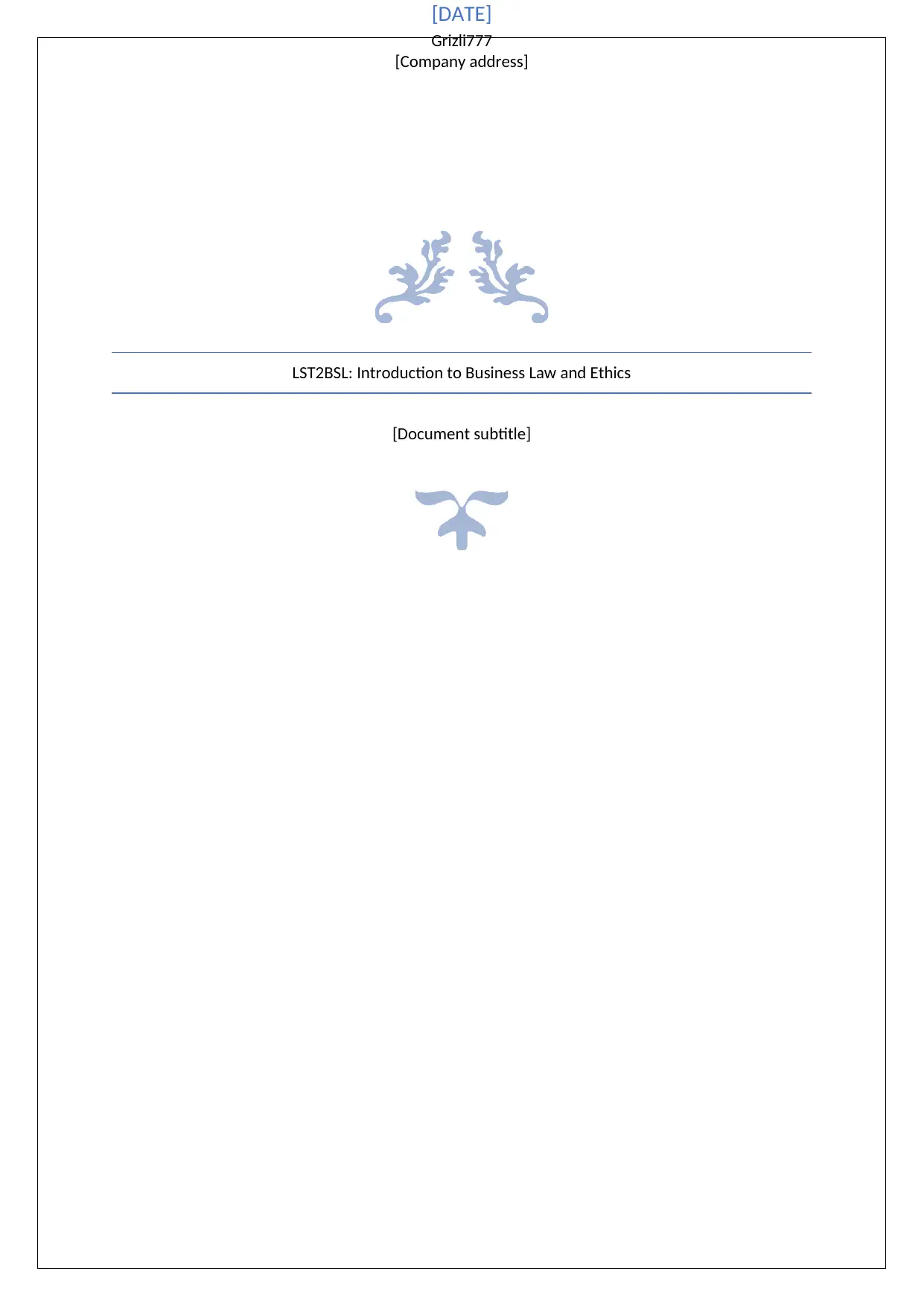
LST2BSL: Introduction to Business Law and Ethics
[Document subtitle]
[DATE]
Grizli777
[Company address]
[Document subtitle]
[DATE]
Grizli777
[Company address]
Paraphrase This Document
Need a fresh take? Get an instant paraphrase of this document with our AI Paraphraser
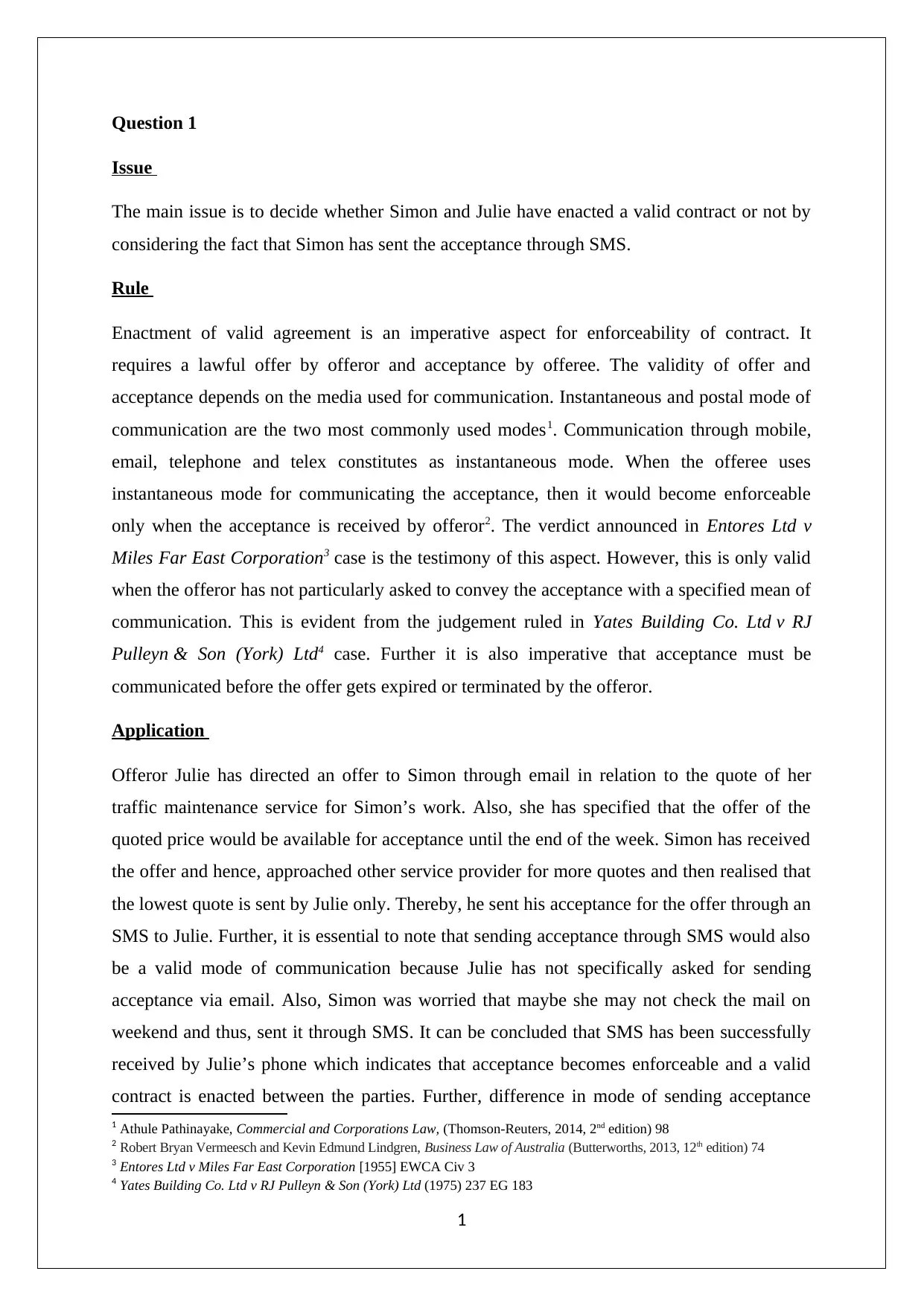
Question 1
Issue
The main issue is to decide whether Simon and Julie have enacted a valid contract or not by
considering the fact that Simon has sent the acceptance through SMS.
Rule
Enactment of valid agreement is an imperative aspect for enforceability of contract. It
requires a lawful offer by offeror and acceptance by offeree. The validity of offer and
acceptance depends on the media used for communication. Instantaneous and postal mode of
communication are the two most commonly used modes1. Communication through mobile,
email, telephone and telex constitutes as instantaneous mode. When the offeree uses
instantaneous mode for communicating the acceptance, then it would become enforceable
only when the acceptance is received by offeror2. The verdict announced in Entores Ltd v
Miles Far East Corporation3 case is the testimony of this aspect. However, this is only valid
when the offeror has not particularly asked to convey the acceptance with a specified mean of
communication. This is evident from the judgement ruled in Yates Building Co. Ltd v RJ
Pulleyn & Son (York) Ltd4 case. Further it is also imperative that acceptance must be
communicated before the offer gets expired or terminated by the offeror.
Application
Offeror Julie has directed an offer to Simon through email in relation to the quote of her
traffic maintenance service for Simon’s work. Also, she has specified that the offer of the
quoted price would be available for acceptance until the end of the week. Simon has received
the offer and hence, approached other service provider for more quotes and then realised that
the lowest quote is sent by Julie only. Thereby, he sent his acceptance for the offer through an
SMS to Julie. Further, it is essential to note that sending acceptance through SMS would also
be a valid mode of communication because Julie has not specifically asked for sending
acceptance via email. Also, Simon was worried that maybe she may not check the mail on
weekend and thus, sent it through SMS. It can be concluded that SMS has been successfully
received by Julie’s phone which indicates that acceptance becomes enforceable and a valid
contract is enacted between the parties. Further, difference in mode of sending acceptance
1 Athule Pathinayake, Commercial and Corporations Law, (Thomson-Reuters, 2014, 2nd edition) 98
2 Robert Bryan Vermeesch and Kevin Edmund Lindgren, Business Law of Australia (Butterworths, 2013, 12th edition) 74
3 Entores Ltd v Miles Far East Corporation [1955] EWCA Civ 3
4 Yates Building Co. Ltd v RJ Pulleyn & Son (York) Ltd (1975) 237 EG 183
1
Issue
The main issue is to decide whether Simon and Julie have enacted a valid contract or not by
considering the fact that Simon has sent the acceptance through SMS.
Rule
Enactment of valid agreement is an imperative aspect for enforceability of contract. It
requires a lawful offer by offeror and acceptance by offeree. The validity of offer and
acceptance depends on the media used for communication. Instantaneous and postal mode of
communication are the two most commonly used modes1. Communication through mobile,
email, telephone and telex constitutes as instantaneous mode. When the offeree uses
instantaneous mode for communicating the acceptance, then it would become enforceable
only when the acceptance is received by offeror2. The verdict announced in Entores Ltd v
Miles Far East Corporation3 case is the testimony of this aspect. However, this is only valid
when the offeror has not particularly asked to convey the acceptance with a specified mean of
communication. This is evident from the judgement ruled in Yates Building Co. Ltd v RJ
Pulleyn & Son (York) Ltd4 case. Further it is also imperative that acceptance must be
communicated before the offer gets expired or terminated by the offeror.
Application
Offeror Julie has directed an offer to Simon through email in relation to the quote of her
traffic maintenance service for Simon’s work. Also, she has specified that the offer of the
quoted price would be available for acceptance until the end of the week. Simon has received
the offer and hence, approached other service provider for more quotes and then realised that
the lowest quote is sent by Julie only. Thereby, he sent his acceptance for the offer through an
SMS to Julie. Further, it is essential to note that sending acceptance through SMS would also
be a valid mode of communication because Julie has not specifically asked for sending
acceptance via email. Also, Simon was worried that maybe she may not check the mail on
weekend and thus, sent it through SMS. It can be concluded that SMS has been successfully
received by Julie’s phone which indicates that acceptance becomes enforceable and a valid
contract is enacted between the parties. Further, difference in mode of sending acceptance
1 Athule Pathinayake, Commercial and Corporations Law, (Thomson-Reuters, 2014, 2nd edition) 98
2 Robert Bryan Vermeesch and Kevin Edmund Lindgren, Business Law of Australia (Butterworths, 2013, 12th edition) 74
3 Entores Ltd v Miles Far East Corporation [1955] EWCA Civ 3
4 Yates Building Co. Ltd v RJ Pulleyn & Son (York) Ltd (1975) 237 EG 183
1
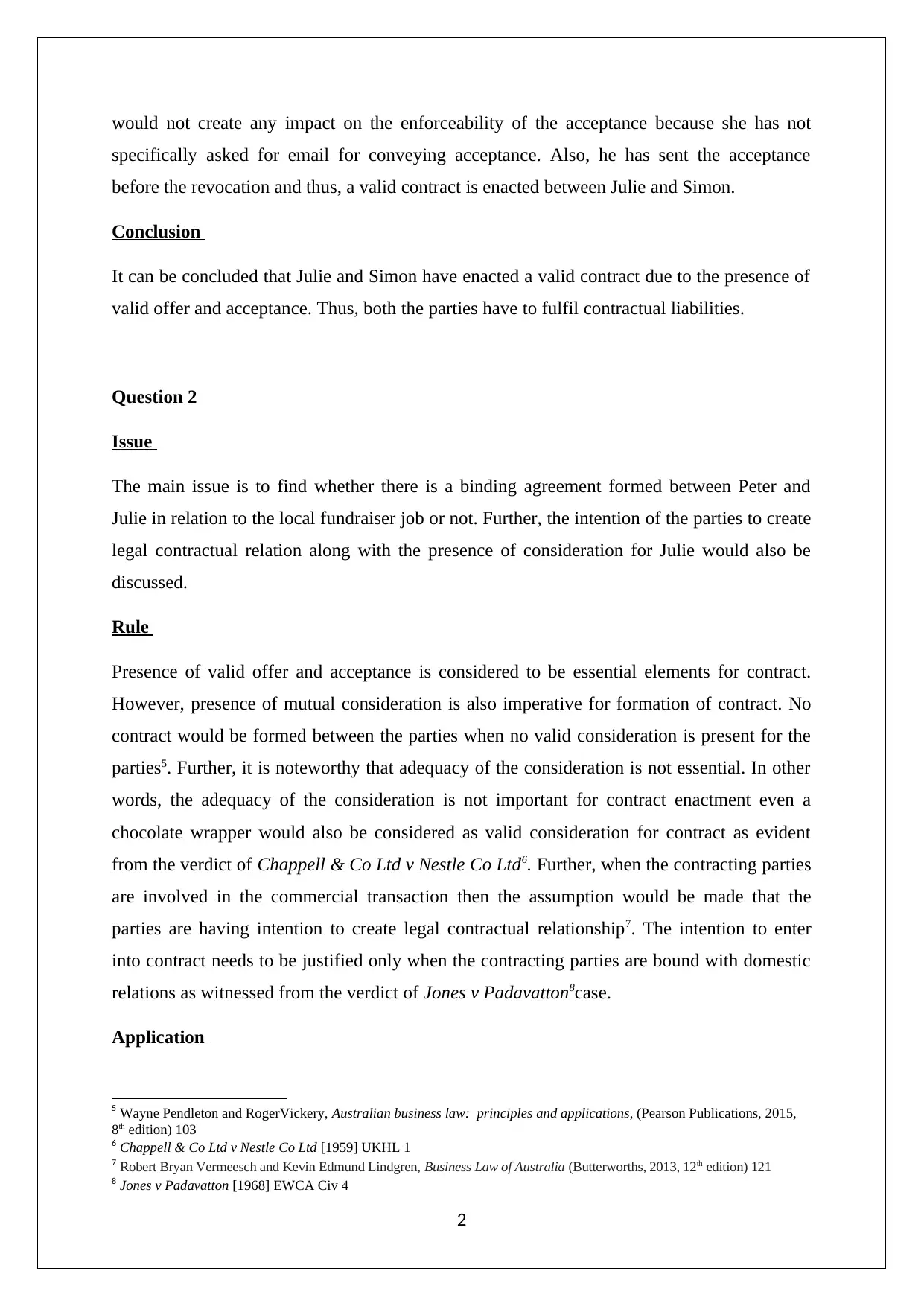
would not create any impact on the enforceability of the acceptance because she has not
specifically asked for email for conveying acceptance. Also, he has sent the acceptance
before the revocation and thus, a valid contract is enacted between Julie and Simon.
Conclusion
It can be concluded that Julie and Simon have enacted a valid contract due to the presence of
valid offer and acceptance. Thus, both the parties have to fulfil contractual liabilities.
Question 2
Issue
The main issue is to find whether there is a binding agreement formed between Peter and
Julie in relation to the local fundraiser job or not. Further, the intention of the parties to create
legal contractual relation along with the presence of consideration for Julie would also be
discussed.
Rule
Presence of valid offer and acceptance is considered to be essential elements for contract.
However, presence of mutual consideration is also imperative for formation of contract. No
contract would be formed between the parties when no valid consideration is present for the
parties5. Further, it is noteworthy that adequacy of the consideration is not essential. In other
words, the adequacy of the consideration is not important for contract enactment even a
chocolate wrapper would also be considered as valid consideration for contract as evident
from the verdict of Chappell & Co Ltd v Nestle Co Ltd6. Further, when the contracting parties
are involved in the commercial transaction then the assumption would be made that the
parties are having intention to create legal contractual relationship7. The intention to enter
into contract needs to be justified only when the contracting parties are bound with domestic
relations as witnessed from the verdict of Jones v Padavatton8case.
Application
5 Wayne Pendleton and RogerVickery, Australian business law: principles and applications, (Pearson Publications, 2015,
8th edition) 103
6 Chappell & Co Ltd v Nestle Co Ltd [1959] UKHL 1
7 Robert Bryan Vermeesch and Kevin Edmund Lindgren, Business Law of Australia (Butterworths, 2013, 12th edition) 121
8 Jones v Padavatton [1968] EWCA Civ 4
2
specifically asked for email for conveying acceptance. Also, he has sent the acceptance
before the revocation and thus, a valid contract is enacted between Julie and Simon.
Conclusion
It can be concluded that Julie and Simon have enacted a valid contract due to the presence of
valid offer and acceptance. Thus, both the parties have to fulfil contractual liabilities.
Question 2
Issue
The main issue is to find whether there is a binding agreement formed between Peter and
Julie in relation to the local fundraiser job or not. Further, the intention of the parties to create
legal contractual relation along with the presence of consideration for Julie would also be
discussed.
Rule
Presence of valid offer and acceptance is considered to be essential elements for contract.
However, presence of mutual consideration is also imperative for formation of contract. No
contract would be formed between the parties when no valid consideration is present for the
parties5. Further, it is noteworthy that adequacy of the consideration is not essential. In other
words, the adequacy of the consideration is not important for contract enactment even a
chocolate wrapper would also be considered as valid consideration for contract as evident
from the verdict of Chappell & Co Ltd v Nestle Co Ltd6. Further, when the contracting parties
are involved in the commercial transaction then the assumption would be made that the
parties are having intention to create legal contractual relationship7. The intention to enter
into contract needs to be justified only when the contracting parties are bound with domestic
relations as witnessed from the verdict of Jones v Padavatton8case.
Application
5 Wayne Pendleton and RogerVickery, Australian business law: principles and applications, (Pearson Publications, 2015,
8th edition) 103
6 Chappell & Co Ltd v Nestle Co Ltd [1959] UKHL 1
7 Robert Bryan Vermeesch and Kevin Edmund Lindgren, Business Law of Australia (Butterworths, 2013, 12th edition) 121
8 Jones v Padavatton [1968] EWCA Civ 4
2
⊘ This is a preview!⊘
Do you want full access?
Subscribe today to unlock all pages.

Trusted by 1+ million students worldwide
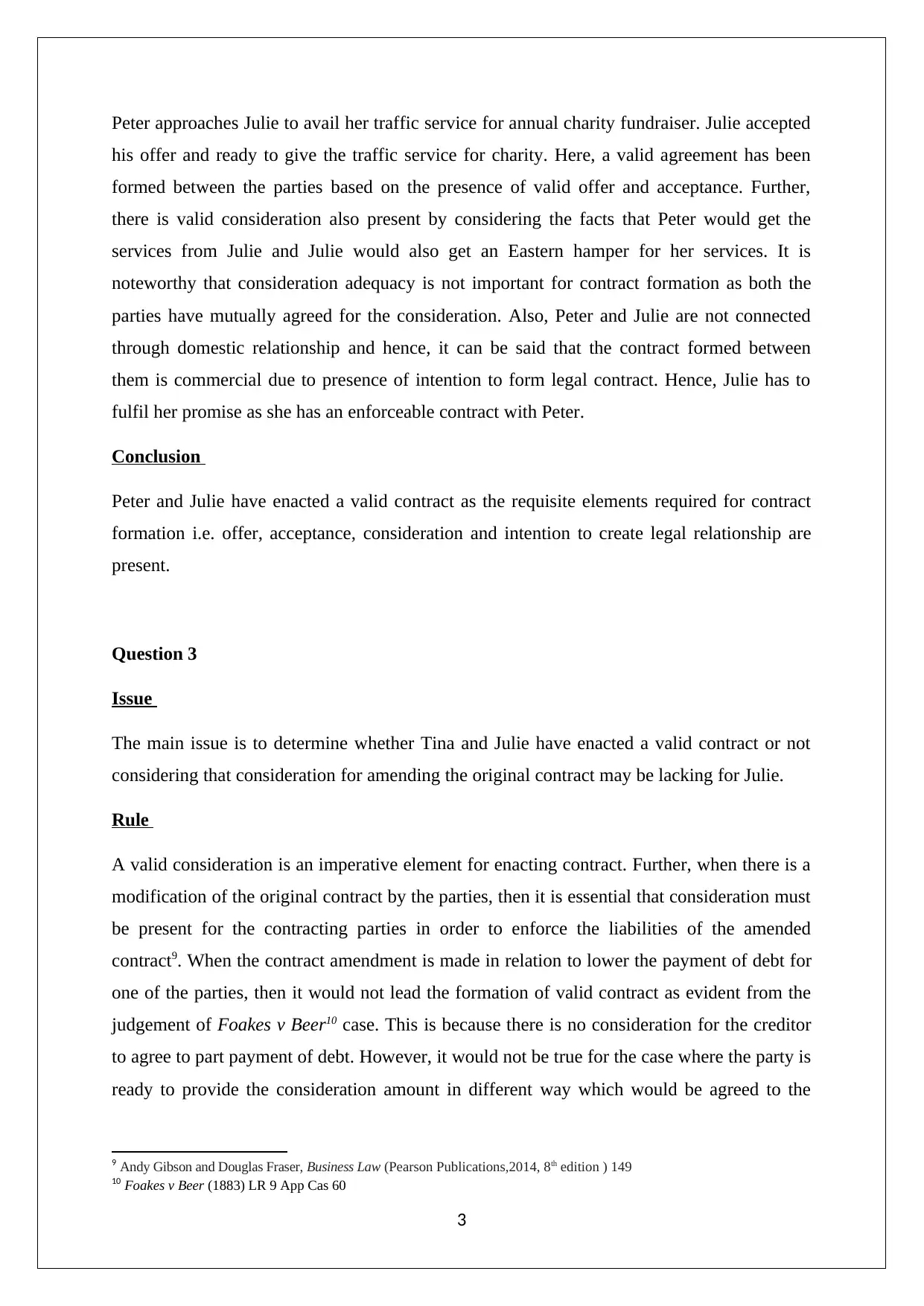
Peter approaches Julie to avail her traffic service for annual charity fundraiser. Julie accepted
his offer and ready to give the traffic service for charity. Here, a valid agreement has been
formed between the parties based on the presence of valid offer and acceptance. Further,
there is valid consideration also present by considering the facts that Peter would get the
services from Julie and Julie would also get an Eastern hamper for her services. It is
noteworthy that consideration adequacy is not important for contract formation as both the
parties have mutually agreed for the consideration. Also, Peter and Julie are not connected
through domestic relationship and hence, it can be said that the contract formed between
them is commercial due to presence of intention to form legal contract. Hence, Julie has to
fulfil her promise as she has an enforceable contract with Peter.
Conclusion
Peter and Julie have enacted a valid contract as the requisite elements required for contract
formation i.e. offer, acceptance, consideration and intention to create legal relationship are
present.
Question 3
Issue
The main issue is to determine whether Tina and Julie have enacted a valid contract or not
considering that consideration for amending the original contract may be lacking for Julie.
Rule
A valid consideration is an imperative element for enacting contract. Further, when there is a
modification of the original contract by the parties, then it is essential that consideration must
be present for the contracting parties in order to enforce the liabilities of the amended
contract9. When the contract amendment is made in relation to lower the payment of debt for
one of the parties, then it would not lead the formation of valid contract as evident from the
judgement of Foakes v Beer10 case. This is because there is no consideration for the creditor
to agree to part payment of debt. However, it would not be true for the case where the party is
ready to provide the consideration amount in different way which would be agreed to the
9 Andy Gibson and Douglas Fraser, Business Law (Pearson Publications,2014, 8th edition ) 149
10 Foakes v Beer (1883) LR 9 App Cas 60
3
his offer and ready to give the traffic service for charity. Here, a valid agreement has been
formed between the parties based on the presence of valid offer and acceptance. Further,
there is valid consideration also present by considering the facts that Peter would get the
services from Julie and Julie would also get an Eastern hamper for her services. It is
noteworthy that consideration adequacy is not important for contract formation as both the
parties have mutually agreed for the consideration. Also, Peter and Julie are not connected
through domestic relationship and hence, it can be said that the contract formed between
them is commercial due to presence of intention to form legal contract. Hence, Julie has to
fulfil her promise as she has an enforceable contract with Peter.
Conclusion
Peter and Julie have enacted a valid contract as the requisite elements required for contract
formation i.e. offer, acceptance, consideration and intention to create legal relationship are
present.
Question 3
Issue
The main issue is to determine whether Tina and Julie have enacted a valid contract or not
considering that consideration for amending the original contract may be lacking for Julie.
Rule
A valid consideration is an imperative element for enacting contract. Further, when there is a
modification of the original contract by the parties, then it is essential that consideration must
be present for the contracting parties in order to enforce the liabilities of the amended
contract9. When the contract amendment is made in relation to lower the payment of debt for
one of the parties, then it would not lead the formation of valid contract as evident from the
judgement of Foakes v Beer10 case. This is because there is no consideration for the creditor
to agree to part payment of debt. However, it would not be true for the case where the party is
ready to provide the consideration amount in different way which would be agreed to the
9 Andy Gibson and Douglas Fraser, Business Law (Pearson Publications,2014, 8th edition ) 149
10 Foakes v Beer (1883) LR 9 App Cas 60
3
Paraphrase This Document
Need a fresh take? Get an instant paraphrase of this document with our AI Paraphraser
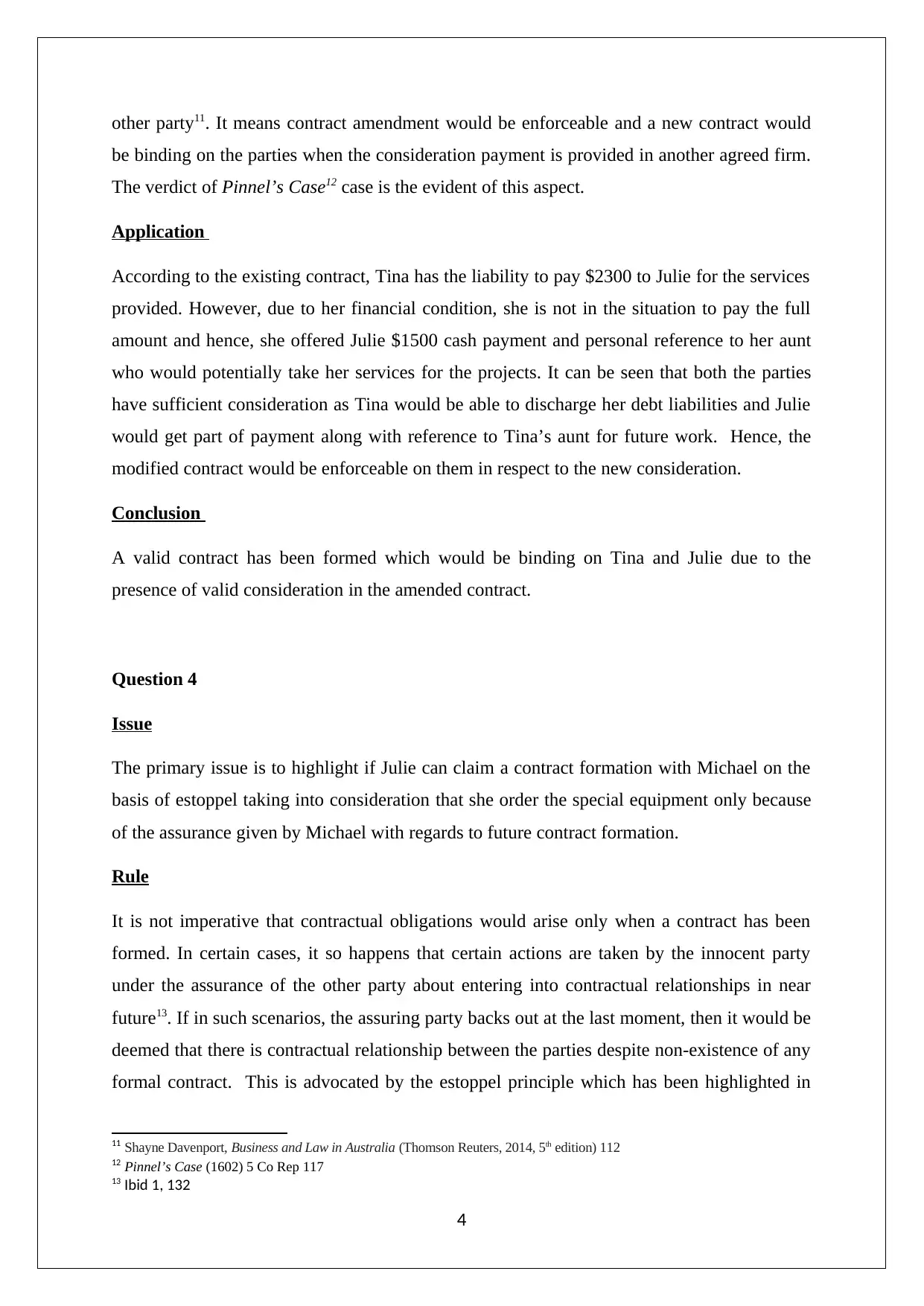
other party11. It means contract amendment would be enforceable and a new contract would
be binding on the parties when the consideration payment is provided in another agreed firm.
The verdict of Pinnel’s Case12 case is the evident of this aspect.
Application
According to the existing contract, Tina has the liability to pay $2300 to Julie for the services
provided. However, due to her financial condition, she is not in the situation to pay the full
amount and hence, she offered Julie $1500 cash payment and personal reference to her aunt
who would potentially take her services for the projects. It can be seen that both the parties
have sufficient consideration as Tina would be able to discharge her debt liabilities and Julie
would get part of payment along with reference to Tina’s aunt for future work. Hence, the
modified contract would be enforceable on them in respect to the new consideration.
Conclusion
A valid contract has been formed which would be binding on Tina and Julie due to the
presence of valid consideration in the amended contract.
Question 4
Issue
The primary issue is to highlight if Julie can claim a contract formation with Michael on the
basis of estoppel taking into consideration that she order the special equipment only because
of the assurance given by Michael with regards to future contract formation.
Rule
It is not imperative that contractual obligations would arise only when a contract has been
formed. In certain cases, it so happens that certain actions are taken by the innocent party
under the assurance of the other party about entering into contractual relationships in near
future13. If in such scenarios, the assuring party backs out at the last moment, then it would be
deemed that there is contractual relationship between the parties despite non-existence of any
formal contract. This is advocated by the estoppel principle which has been highlighted in
11 Shayne Davenport, Business and Law in Australia (Thomson Reuters, 2014, 5th edition) 112
12 Pinnel’s Case (1602) 5 Co Rep 117
13 Ibid 1, 132
4
be binding on the parties when the consideration payment is provided in another agreed firm.
The verdict of Pinnel’s Case12 case is the evident of this aspect.
Application
According to the existing contract, Tina has the liability to pay $2300 to Julie for the services
provided. However, due to her financial condition, she is not in the situation to pay the full
amount and hence, she offered Julie $1500 cash payment and personal reference to her aunt
who would potentially take her services for the projects. It can be seen that both the parties
have sufficient consideration as Tina would be able to discharge her debt liabilities and Julie
would get part of payment along with reference to Tina’s aunt for future work. Hence, the
modified contract would be enforceable on them in respect to the new consideration.
Conclusion
A valid contract has been formed which would be binding on Tina and Julie due to the
presence of valid consideration in the amended contract.
Question 4
Issue
The primary issue is to highlight if Julie can claim a contract formation with Michael on the
basis of estoppel taking into consideration that she order the special equipment only because
of the assurance given by Michael with regards to future contract formation.
Rule
It is not imperative that contractual obligations would arise only when a contract has been
formed. In certain cases, it so happens that certain actions are taken by the innocent party
under the assurance of the other party about entering into contractual relationships in near
future13. If in such scenarios, the assuring party backs out at the last moment, then it would be
deemed that there is contractual relationship between the parties despite non-existence of any
formal contract. This is advocated by the estoppel principle which has been highlighted in
11 Shayne Davenport, Business and Law in Australia (Thomson Reuters, 2014, 5th edition) 112
12 Pinnel’s Case (1602) 5 Co Rep 117
13 Ibid 1, 132
4
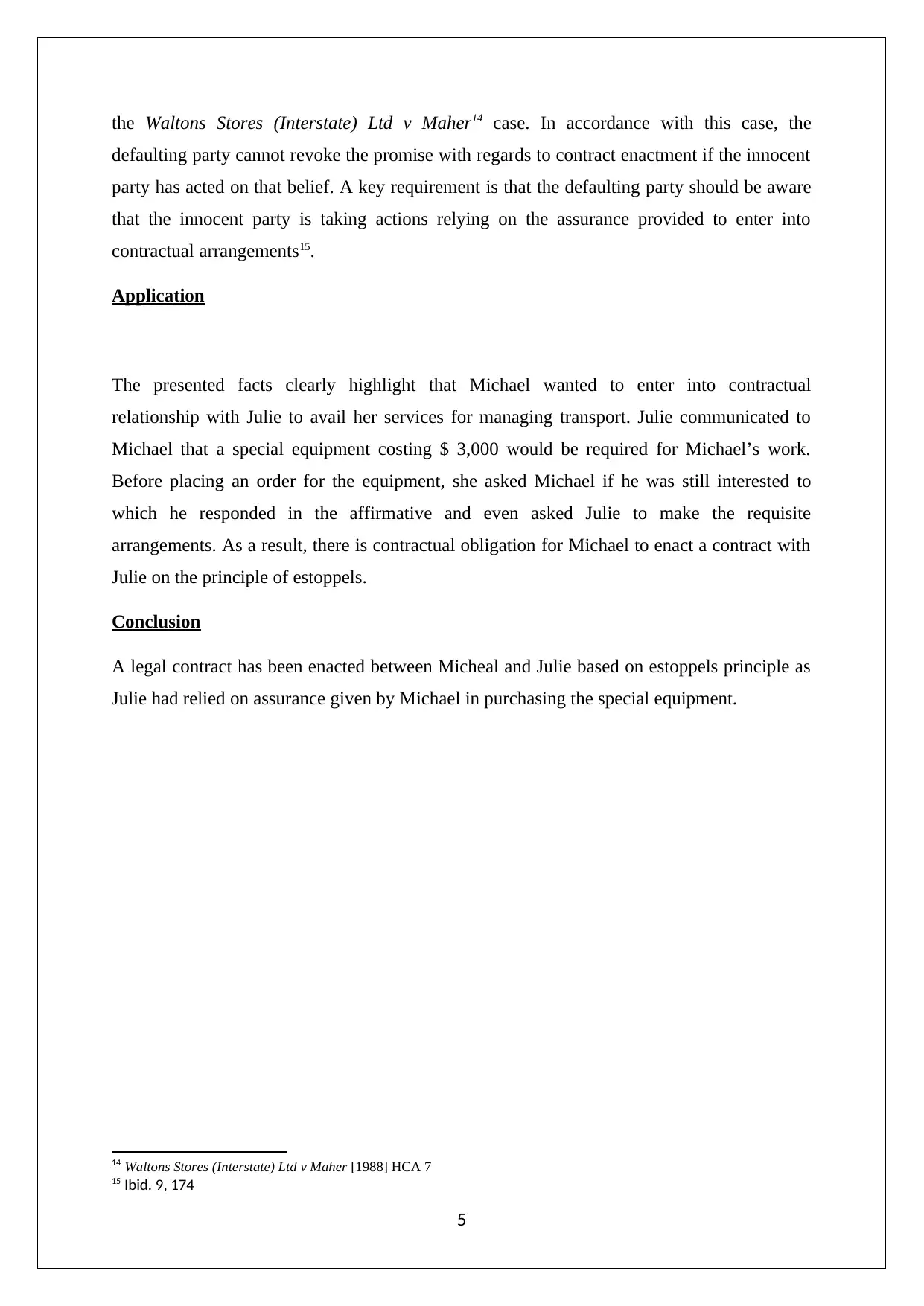
the Waltons Stores (Interstate) Ltd v Maher14 case. In accordance with this case, the
defaulting party cannot revoke the promise with regards to contract enactment if the innocent
party has acted on that belief. A key requirement is that the defaulting party should be aware
that the innocent party is taking actions relying on the assurance provided to enter into
contractual arrangements15.
Application
The presented facts clearly highlight that Michael wanted to enter into contractual
relationship with Julie to avail her services for managing transport. Julie communicated to
Michael that a special equipment costing $ 3,000 would be required for Michael’s work.
Before placing an order for the equipment, she asked Michael if he was still interested to
which he responded in the affirmative and even asked Julie to make the requisite
arrangements. As a result, there is contractual obligation for Michael to enact a contract with
Julie on the principle of estoppels.
Conclusion
A legal contract has been enacted between Micheal and Julie based on estoppels principle as
Julie had relied on assurance given by Michael in purchasing the special equipment.
14 Waltons Stores (Interstate) Ltd v Maher [1988] HCA 7
15 Ibid. 9, 174
5
defaulting party cannot revoke the promise with regards to contract enactment if the innocent
party has acted on that belief. A key requirement is that the defaulting party should be aware
that the innocent party is taking actions relying on the assurance provided to enter into
contractual arrangements15.
Application
The presented facts clearly highlight that Michael wanted to enter into contractual
relationship with Julie to avail her services for managing transport. Julie communicated to
Michael that a special equipment costing $ 3,000 would be required for Michael’s work.
Before placing an order for the equipment, she asked Michael if he was still interested to
which he responded in the affirmative and even asked Julie to make the requisite
arrangements. As a result, there is contractual obligation for Michael to enact a contract with
Julie on the principle of estoppels.
Conclusion
A legal contract has been enacted between Micheal and Julie based on estoppels principle as
Julie had relied on assurance given by Michael in purchasing the special equipment.
14 Waltons Stores (Interstate) Ltd v Maher [1988] HCA 7
15 Ibid. 9, 174
5
⊘ This is a preview!⊘
Do you want full access?
Subscribe today to unlock all pages.

Trusted by 1+ million students worldwide
1 out of 6
Related Documents
Your All-in-One AI-Powered Toolkit for Academic Success.
+13062052269
info@desklib.com
Available 24*7 on WhatsApp / Email
![[object Object]](/_next/static/media/star-bottom.7253800d.svg)
Unlock your academic potential
Copyright © 2020–2025 A2Z Services. All Rights Reserved. Developed and managed by ZUCOL.





